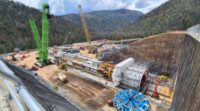Growth Trajectory
Cardno is a far cry from the $14.8-million firm Buckley took over in 1997 that began as an engineering partnership supporting the U.S. Army in Australia during World War II. Before that, he had been regional manager for an Australian mining engineer, Kinhill Engineers Pty, which is now part of Houston-based KBR. Buckley opted to move the firm away from dependence on infrastructure work in Queensland and started a wave of acquisitions elsewhere in Australia.
Traditional physical infrastructure still makes up 65% of Cardno's work. The firm is part of a joint-venture team designing a 4.6-kilometer-long, $1.6-billion tunnel project in Brisbane, set for completion in 2014. It also provided engineering on the 2.1-km-long Phu My Bridge in Ho Chi Minh City, Vietnam, and technical advice to Abu Dhabi's water-wastewater utility in privatizing and upgrading sewerage facilities.
An acquisition of an Australian software business in 2000 with a Portland, Ore., location launched the juggernaut into the Western Hemisphere. “When you look around the world, North America stands out as a beacon,” says Buckley. “It's the biggest economy in the world and the most significant professional services market.” Cardno also acquired a Washington, D.C.-based firm with ties to internationally funded aid work. Its U.S. software firm led to the 2007 acquisition of land development firm WRG, just before the collapse of real estate values. The business tanked. “It's absolutely fair to say that it was not as successful for shareholders as we would have liked,” says Buckley.
But Cardno's high hopes for its U.S. businesses are starting to be realized through subsequent purchases, fate and the firm's approach to integration and employee development. Consultant Avelini cites the parent firm's “collegial culture,” flexibility in deal-making, “transparency” in delivering on pre-closing promises and autonomy to U.S. managers. He credits Cardno for sticking with WRG, whose staff it is now repurposing to chase work in sectors such as transportation.
Cardno's purchase of Clearwater, Fla.-based Tampa Bay Engineering was set to close in September 2008 just as the U.S. financial system was going into meltdown. “They didn't change the terms or try to renegotiate,” says Patrick L. Beyer, president of the renamed CardnoTBE unit, which had about $60 million in revenue, mostly in transportation and underground utility work. He notes the additional opportunities to cross-sell services, adding that the parent also collaborates with its units in making acquisitions and encourages them to target their own. For example, Beyer says his unit's bottom line will benefit from Cardno's purchase of an Australian subsurface utility firm in 2010.
But it is the Australian parent's twin purchases last year of U.S. environmental management firmsENTRIX and ERI that has proved especially beneficial to all involved. With strong ties in the oil-and-gas and petrochemical sectors, their expertise in environmental response was tapped by BP to respond to the Deepwater Horizon oil spill. A Cardno publication says the CardnoENTRIX response “included more than 400 active spill respondents at its peak.” Analysts were pleased with the resulting spike in revenue and profits. CardnoENTRIX also is believed to be advising ExxonMobil on the impacts of an oil pipeline leak earlier this month in Montana's Yellowstone River. A Cardno spokeswoman declines to confirm the unit's role.
CardnoENTRIX also has gained from its parent's purchase of JFNew, an Indiana natural-resources engineer with 130 employees. The firm, which struggled with ownership transition and how to finance future growth, will integrate through CardnoENTRIX.
While Buckley is the visionary of Cardno's global push, Renshaw, 39, runs its worldwide software operations and growth in the Americas. Based in Portland, Ore., he is the only Australian executive dispatched to the U.S. and says he was, in 2003, Cardno's first “non-technical” management hire. Many tout Renshaw as Buckley's heir apparent.
Cardno avoids firms whose management is looking to cash out, says Renshaw. Instead, it seeks “leaders in their segment of the market and [those] who see in Cardno a partner that can help them realize their own growth ambitions more quickly,” he says. ENTRIX had many suitors, says Todd Williams, president of CardnoENTRIX. He is pushing the parent's water-energy efforts, terming it the “blue growth strategy.”











Post a comment to this article
Report Abusive Comment